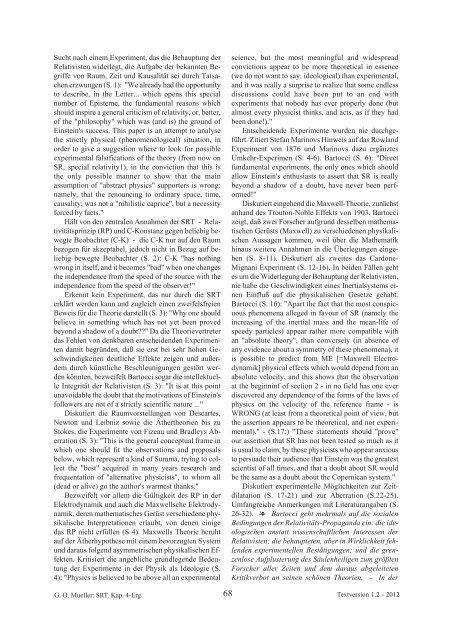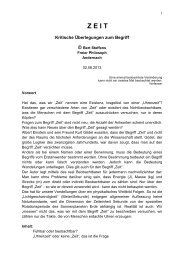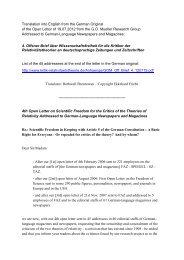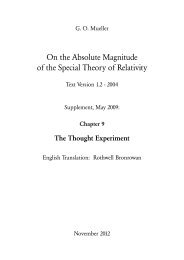2394 weitere kritische Veröffentlichungen - Kritische Stimmen zur ...
2394 weitere kritische Veröffentlichungen - Kritische Stimmen zur ...
2394 weitere kritische Veröffentlichungen - Kritische Stimmen zur ...
Sie wollen auch ein ePaper? Erhöhen Sie die Reichweite Ihrer Titel.
YUMPU macht aus Druck-PDFs automatisch weboptimierte ePaper, die Google liebt.
Sucht nach einem Experiment, das die Behauptung der<br />
Relativisten widerlegt, die Aufgabe der bekannten Begriffe<br />
von Raum, Zeit und Kausalität sei durch Tatsachen<br />
erzwungen (S. 1): "We already had the opportunity<br />
to describe, in the Letter... which opens this special<br />
number of Episteme, the fundamental reasons which<br />
should inspire a general criticism of relativity, or, better,<br />
of the "philosophy" which was (and is) the ground of<br />
Einstein's success. This paper is an attempt to analyse<br />
the strictly physical (phenomenological) situation, in<br />
order to give a suggestion where to look for possible<br />
experimental falsifications of the theory (from now on<br />
SR, special relativity1), in the conviction that this is<br />
the only possible manner to show that the main<br />
assumption of "abstract physics" supporters is wrong:<br />
namely, that the renouncing to ordinary space, time,<br />
causality, was not a "nihilistic caprice", but a necessity<br />
forced by facts."<br />
Hält von den zentralen Annahmen der SRT - Relativitätsprinzip<br />
(RP) und C-Konstanz gegen beliebig bewegte<br />
Beobachter (C-K) - die C-K nur auf den Raum<br />
bezogen für akzeptabel, jedoch nicht in Bezug auf beliebig<br />
bewegte Beobachter (S. 2): C-K "has nothing<br />
wrong in itself, and it becomes "bad" when one changes<br />
the independence from the speed of the source with the<br />
independence from the speed of the observer!"<br />
Erkennt kein Experiment, das nur durch die SRT<br />
erklärt werden kann und zugleich einen zweifelsfreien<br />
Beweis für die Theorie darstellt (S. 3): "Why one should<br />
believe in something which has not yet been proved<br />
beyond a shadow of a doubt??" Da die Theorievertreter<br />
das Fehlen von denkbaren entscheidenden Experimenten<br />
damit begründen, daß sie erst bei sehr hohen Geschwindigkeiten<br />
deutliche Effekte zeigen und außerdem<br />
durch künstliche Beschleunigungen gestört werden<br />
könnten, bezweifelt Bartocci sogar die intellektuelle<br />
Integrität der Relativisten (S. 3): "It is at this point<br />
unavoidable the doubt that the motivations of Einstein's<br />
followers are not of a strictly scientific nature ..."<br />
Diskutiert die Raumvorstellungen von Descartes,<br />
Newton und Leibniz sowie die Äthertheorien bis zu<br />
Stokes, die Experimente von Fizeau und Bradleys Aberration<br />
(S. 3): "This is the general conceptual frame in<br />
which one should fit the observations and proposals<br />
below, which represent a kind of Summa, trying to collect<br />
the "best" acquired in many years research and<br />
frequentation of "alternative physicists", to whom all<br />
(dead or alive) go the author's warmest thanks."<br />
Bezweifelt vor allem die Gültigkeit des RP in der<br />
Elektrodynamik und auch die Maxwellsche Elektrodynamik,<br />
deren mathematisches Gerüst verschiedene physikalische<br />
Interpretationen erlaubt, von denen einige<br />
das RP nicht erfüllen (S 4). Maxwells Theorie beruht<br />
auf der Ätherhypothese mit einem bevorzugten System<br />
und daraus folgend asymmetrischen physikalischen Effekten.<br />
Kritisiert die angebliche grundlegende Bedeutung<br />
der Experimente in der Physik als Ideologie (S.<br />
4): "Physics is believed to be above all an experimental<br />
G. O. Mueller: SRT. Kap. 4-Erg.<br />
68<br />
science, but the most meaningful and widespread<br />
convictions appear to be more theoretical in essence<br />
(we do not want to say: ideological) than experimental,<br />
and it was really a surprise to realize that some endless<br />
discussions could have been put to an end with<br />
experiments that nobody has ever properly done (but<br />
almost every physicist thinks, and acts, as if they had<br />
been done!)."<br />
Entscheidende Experimente wurden nie durchgeführt.<br />
Zitiert Stefan Marinovs Hinweis auf das Rowland<br />
Experiment von 1876 und Marinovs dazu ergänztes<br />
Umkehr-Experimen (S. 4-6). Bartocci (S. 6): "Direct<br />
fundamental experiments, the only ones which should<br />
allow Einstein's enthusiasts to assert that SR is really<br />
beyond a shadow of a doubt, have never been performed!"<br />
Diskutiert eingehend die Maxwell-Theorie, zunächst<br />
anhand des Trouton-Noble Effekts von 1903. Bartocci<br />
zeigt, daß zwei Forscher aufgrund desselben mathematischen<br />
Gerüsts (Maxwell) zu verschiedenen physikalischen<br />
Aussagen kommen, weil über die Mathematik<br />
hinaus <strong>weitere</strong> Annahmen in die Überlegungen eingehen<br />
(S. 8-11). Diskutiert als zweites das Cardone-<br />
Mignani Experiment (S. 12-16). In beiden Fällen geht<br />
es um die Widerlegung der Behauptung der Relativisten,<br />
nie habe die Geschwindigkeit eines Inertialsystems einen<br />
Einfluß auf die physikalischen Gesetze gehabt.<br />
Bartocci (S. 16): "Apart the fact that the most conspicuous<br />
phenomena alleged in favour of SR (namely the<br />
increasing of the inertial mass and the mean-life of<br />
speedy particles) appear rather more compatible with<br />
an "absolute theory", than conversely (in absence of<br />
any evidence about a symmetry of these phenomena), it<br />
is possible to predict from ME [=Maxwell Electrodynamik]<br />
physical effects which would depend from an<br />
absolute velocity, and this shows that the observation<br />
at the beginninf of section 2 - in no field has one ever<br />
discovered any dependence of the forms of the laws of<br />
physics on the velocity of the reference frame - is<br />
WRONG (at least from a theoretical point of view, but<br />
the assertion appears to be theoretical, and not experimental)."<br />
- (S.17:) "These statements should "prove"<br />
our assertion that SR has not been tested so much as it<br />
is usual to claim, by those physicists who appear anxious<br />
to persuade their audience that Einstein was the greatest<br />
scientist of all times, and that a doubt about SR would<br />
be the same as a doubt about the Copernican system."<br />
Diskutiert experimentelle Möglichkeiten <strong>zur</strong> Zeitdilatation<br />
(S. 17-21) und <strong>zur</strong> Aberration (S.22-25).<br />
Umfangreiche Anmerkungen mit Literaturangaben (S.<br />
26-32). � Bartocci geht mehrmals auf die sozialen<br />
Bedingungen der Relativitäts-Propaganda ein: die ideologischen<br />
anstatt wissenschaftlichen Interessen der<br />
Relativisten; die behaupteten, aber in Wirklichkeit fehlenden<br />
experimentellen Bestätigungen; und die grenzenlose<br />
Aufplusterung des Säulenheiligen zum größten<br />
Forscher aller Zeiten und dem daraus abgeleiteten<br />
Kritikverbot an seinen schönen Theorien. - In der<br />
Textversion 1.2 - 2012





